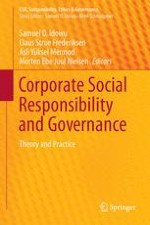2015 | OriginalPaper | Buchkapitel
9. Is It Time for Integrated Reporting in Small and Medium-Sized Enterprises? Reflections on an Italian Experience
verfasst von : Mara Del Baldo
Erschienen in: Corporate Social Responsibility and Governance
Aktivieren Sie unsere intelligente Suche, um passende Fachinhalte oder Patente zu finden.
Wählen Sie Textabschnitte aus um mit Künstlicher Intelligenz passenden Patente zu finden. powered by
Markieren Sie Textabschnitte, um KI-gestützt weitere passende Inhalte zu finden. powered by
